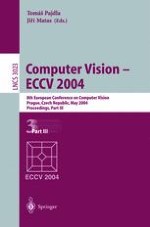2004 | OriginalPaper | Chapter
Intrinsic Images by Entropy Minimization
Authors : Graham D. Finlayson, Mark S. Drew, Cheng Lu
Published in: Computer Vision - ECCV 2004
Publisher: Springer Berlin Heidelberg
Included in: Professional Book Archive
Activate our intelligent search to find suitable subject content or patents.
Select sections of text to find matching patents with Artificial Intelligence. powered by
Select sections of text to find additional relevant content using AI-assisted search. powered by
A method was recently devised for the recovery of an invariant image from a 3-band colour image. The invariant image, originally 1D greyscale but here derived as a 2D chromaticity, is independent of lighting, and also has shading removed: it forms an intrinsic image that may be used as a guide in recovering colour images that are independent of illumination conditions. Invariance to illuminant colour and intensity means that such images are free of shadows, as well, to a good degree. The method devised finds an intrinsic reflectivity image based on assumptions of Lambertian reflectance, approximately Planckian lighting, and fairly narrowband camera sensors. Nevertheless, the method works well when these assumptions do not hold. A crucial piece of information is the angle for an “invariant direction” in a log-chromaticity space. To date, we have gleaned this information via a preliminary calibration routine, using the camera involved to capture images of a colour target under different lights. In this paper, we show that we can in fact dispense with the calibration step, by recognizing a simple but important fact: the correct projection is that which minimizes entropy in the resulting invariant image. To show that this must be the case we first consider synthetic images, and then apply the method to real images. We show that not only does a correct shadow-free image emerge, but also that the angle found agrees with that recovered from a calibration. As a result, we can find shadow-free images for images with unknown camera, and the method is applied successfully to remove shadows from unsourced imagery.
